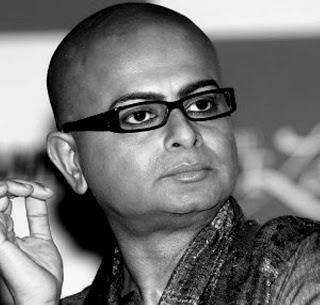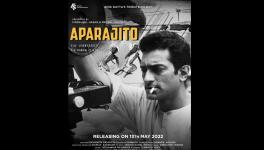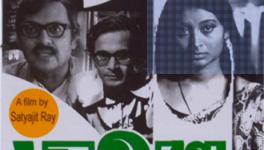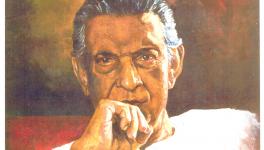Rituparno was a Sensitive Mediator of Culture and Cinema
Kaushik Bhaumik from Osian's Cinefan tells Newsclick what Indian cinema and in particular, Bengali cinema has lost in Rituparno Ghosh's death. He also speaks of how much Ray, Bergman and Almodovar one sees in Rituparno's films and how Rituparno stood out from his contemporaries and inspired aspiring filmmakers. Bhaumik goes on to say that for a long time Rituparno Ghosh was Bengali cinema and that his take on LGBT issues was the most vocal and sensitive.

Abhinav Sabyasachi (AS): Recently Indian cinema lost one of its bold, brave and sensitive filmmakers, Rituparno Ghosh. To talk about what he and his films meant to cinephiles, filmmakers and critics, we have with us Kaushik Bhaumik from Osian's Cinefan film festival.
AS: What does Rituparno's death mean to Indian cinema, in particular to Bengali cinema?
Kaushik Bhaumik (KB): Well, Cinefan as a festival has been connected with Rituparno's career for a very early-on period. In fact in some ways it is very sad because Cinefan started off promoting a new kind of cinema in India with its focus on Asian cinema and in some ways the kind of films Rituparno was making, the kind of 'a new cinema for a new generation in a new film festival for that generation' kind of idea that Cinefan had, i think they came together very well.
And Rituparno was very warm and positive towards Cinefan. A lot of his films were shown. He used to come to the festival quite frequently. So for us, it is almost like loosing a very long-standing friend and somebody with whom our identity is related in a very integral way. The manner in which we focus on the kind of films we show and the kind of films he made, there was a link. There are not many filmmakers in India who do make that kind of cinema that pushes the envelope in terms of social taboos.
It's a big loss and for Bengali cinema, it's a huge loss. In some ways, for a long time he was Bengali cinema. More than that a huge cultural voice has gone out from Bengali culture.
AS: From Hirer Angti to Unishe April to Chitrangadha, how do you view his journey as a director?
KB: I recently examined an M.Phil dissertation at the Arts and Aesthetics department in JNU on Rituparno. It was a very fine dissertation. When you read about something, you remember the films. You have an overview of all the films, when you read dissertation.
What comes through is that Rituparno throughout his career never ever made a film just about something out there. There was one character or a part of him always there in every film. And he was experimenting, i think. All his films are about experimentation, about himself, his biography, his gender, about gender in general, in society, in culture, in cinema. His entire career was a detective being made. 'Now i'm hiding behind this character, then i'm hiding behind that character. Let me see how it looks from this point of view.'
So i think it was an evolutionary process in which there are at least three clear phases. There's one, which is the social phase where he makes films about familial relationships or couple's relationships, which have always something sexual about them. Then there are the historical films, mainly Tagorean and his last phase when he accepted his third sex status and came out and started acting. He made Chitrangada that closed our festival last year.
So it has been a gradual emergence. One can see that all the films as a rehearsal towards some kind of emergence and experimentation with the self. I would like to see his career in those terms.
AS: Rituparno believed Satyajit Ray to be his mentor. He even said that Unishe April was inspired by Ray's Jalsaghar How much Ray do you see in Rituparno's films
KB: Well there is a lot but there is a lot more. There was this whole controversy when Unishe April was released. It resembled not Ray's film but Bergman's Autumn Sonata. Rituparno at that point said he hadn't even seen Bergman's Autumn Sonata. And yet there is a Bergmanesque element. His films are far more verbose than Ray's films. There's far more speech and talk. It's almost like television. One used to remember that Rituparno had a close relationship with Television, which is visible only in Ray's last three films.
Of course there is Ray but Tagore is far more important in his films. There's Bergman and there is Almodovar. There is also a certain kind of relationship with other LGBT filmmakers across the world.
AS: As you were saying, exploring relationships and their dynamics was an integral part of Rituparno's films and his treatment. Did this make him stand out from his contemporaries?
KB: Rituparno himself came at a time when Bengali cinema was in a very bad shape. If you had to compare him with his contemporaries, then of course he stands out in a completely different way. But over time what he did fitted in with Bengali cinema and in other parts of Indian cinema as well where issues of relationships came back into focus after the 1970s and the 80s when 'art house' cinema used to focus on relationships.
Buddhadeb Dasgupta has always made relationship-oriented films towards the latter part of his career. What really made him stand out were his scripts, his eye for detail and his obsessive detailing of nuances of personalities. Sometimes it became too heavy, sometimes too much but (it was visible in) certain films like Asukh and Unishe April.
Shob Charitro Kalponik was a very interesting film where his ability to complexify a character was very unique. He was a literary person. He was very novelistic in his approach. So he had this capacity to nuance things and to show the hidden and unhidden dimensions of a person's personality. That kind of detailing makes him stand out from his contemporaries in a very significant way.
AS: To what extent did Ghosh inspire his contemporaries and aspiring filmmakers?
KB: This dissertation i examined, in fact, it coins a very interesting term called a ‘Rituparnoesque’, which means that it's not just Rituparno but a lifestyle or a style of being or an aesthetic style. Now there's no distinction between parallel and mainstream but a huge number of filmmakers that have come up from the year 2000 onwards have very clearly taken on his idiom, dissected the middle class life with the same kind of aesthetic values, a certain degree of softness and Tagorean values in Bengali cinema.
Earlier Rituparno was this marginal genius who was his own but recently he had started interacting with directors like Kaushik Ganguly, whose film he acted in, Arekti Premer Golpo. Then he was collaborating with Anjan Dutt as well. He was also opening up. Byomkesh is another way of opening up to a new kind of collaboration with a new generation. I think he was beginning to reinvent himself, as it's a very difficult journey.
I mean that isolation of certain kind of personality and a public figure, not being able to express everything about his life at a certain point in his career. All this made him do certain things. Over the years, he came out more and more and collaborated with people. In Arekti Premer Golpo, one of the most sensitive films on LGBT issues ever made in this country, there was so much Rituparno as much as Kaushik Ganguly. So a very interesting phase of Rituparno was opening up and his influence on Bengali cinema cannot be questioned.
AS: Popular culture has many a times changed the stereotypical thinking of masses regarding certain social taboos in society. Rituparno's take on LGBT issues was the most sensitive. How big was his voice for the LGBT community.
KB: I think Rituparno position was more vocal on LGBT issues. There is something really important to be understood here that people will not immediately register. Rituparno was coming up in India with a certain kind of sensitivity to these issues and undoubtedly his depiction of these issues has been the most sensitive. There's nobody who comes close. Everything that Bollywood or Bombay does is very stereotypical.
We at Cinefan's have always, right from the beginning promoted LGBT cinema. Philippines was a very big space of LGBT cinema but in recent world cinema, two directors that readily come to mind, Tsai Ming-Liang from Taiwan and Apichatpong Weerasethakul from Thailand. They are also gay filmmakers. They are not LGBT filmmakers but there are a lot of gay characters in their films. For me, Rituparno was coming up as part of an Asiatic film movement cutting across many directors. I'm just mentioning two of them but there are many directors in Singapore, Indonesia and Philippines.
What is interesting is somehow when Rituparno invokes the Vaishnav tradition in order to say that for him it is easier to understand androgyny and the position of third sex. I think that is something very prevalent Bengal onwards eastwards, where male and female bodies are not so distinguishable, where cultures are not gendered so easily. They are androgynous cultures like China, Japan or South-East Asia.
Later on i think there was too little a gap between his being vocal about accepting a third sex status for himself and his death. But there was some controversy brewing that the LGBT community felt betrayed by this easy acceptance on his part of the third sex. They felt that he would distance himself away from making an issue of being gay or not. He said that it didn't really matter. He was just happy to be a third sex person. I don't want to be defined as heterosexual or homosexual. That just shows how sensitive he was and from the film world he was undoubtedly the most important voice.
AS: Do you think in the second half of his career Rituparno developed a certain fascination for Bollywood and made self-indulgent films?
KB: Without falling into stereotypes, there is a part of gay culture that is starstruck. One of the biggest theorisers of stardom in world cinema theory is also one of the most leading theorists of gay cinema. Richard Dyer. Rituparno himself was sartorially very flamboyant. He liked being a star himself. I think that made him look towards Bollywood. As he became a star, he wanted to play on a bigger canvas. Now this choice could be creative. May be Bengal was not offering him that big canvas to play on.
People who do well in Taiwanese or Honk Kong cinema go off to Hollywood to make films because once you become a director and get ambitious, you need a bigger stage to play on. I think that was more the case. There is of course also Rituparno, the gay director being fascinated with stardom as such.
Interestingly he once told me that Choker Bali was very important for him because he could, through the beauty of Aishwarya and her femininity and her use of jewellery and Saris, come to terms with a certain side of himself. So you can very clearly see in Arekti Premer Golpo when he does the historical role or when he dresses up as Chitrangada with jewels, he's referring back to Aishwarya Rai in Choker Bali.
So it's very complex. There are many dimensions to this. There is the more generic stereotypical vision of the gay director, there is himself as a star wanting to do something on a bigger scale, Bollywood affording him that and then there is this personal angle that through the actresses he is coming to terms with his own femininity and saying, 'okay it is fine for me to dress up as a woman'.
One can see all this as self-indulgence but he's an artist. He can do anything. 'Self-indulgent' is a very difficult term to use with respect to artists. Artists are always self-indulgent. There is never a moment when an artist is not self-indulgent. Sometimes the artist's art might be dialoguing with society and the self-indulgence seems less but it is there. Sometimes the artist says, 'मारो गोली society को।' (To hell with the society) and does what he wants to do and that too on his terms.
For example, D.W. Griffith made Intolerance and Birth of a nation. It's a great film to watch now but in those days people used exactly the same terms. Self-indulgent, too big, too much money spent, the vision is too epic, too dreamy but again Griffith says, 'Now i've made Birth of a nation. I have the whole system in my hand. I've worked so hard. I've been making films according to the system. Now i have been given the creative freedom and the budget. Now let me do what i want to do.' Now the moment the artist says 'what i want to do', however great the film is, it's contextual. In that period it looked self-indulgent, today it looks like a masterpiece.
I think Rituparno became too confused with so many issues going on in his life. More than anything it was the confusion about himself that were coming out and his films were suffering because of that. I think he had lost interest in making films for a few years in between. But then he came out of it in the last 3-4 years of his career. He resolved his personal crisis and began a new phase of his cinema. It's sad that it got cut off the moment things got interesting. So that's why it's very premature to judge things in that sense.
A very clever, intelligent, sensitive mediator of culture, cinema and history has been lost. Rituparno had that stature to actually start a debate. Sometimes famous people help. They can project issues into the masses that ordinary people like you and me can't. It takes a long time to get to that place where masses begin to accept somebody who is transgressive but they accept him because he is intelligent, clever and has qualities. That kind of a space where stardom and slightly transgressive social values and a good cultural debate about certain issues can happen on that level of engagement with society and complexity, takes a long time to create. That space will not come back very soon and that's a huge loss. It takes a long time to get a personality like Rituparno.
AS: Hopefully Rituparno's last film Satyanweshi will release soon. Are you looking forward to it?
KB: Yes. Obviously, he has taken on whatever role he is playing in that film for a certain reason. Any film that he would have decided to act in during this phase would be interesting as he would always be making a comment on gender. One doesn't associate Rituparno with a Byomkesh film but then he is versatile. In any case that film has quite an offbeat casting. Kahaani's director Sujoy Ghosh is in it. So the film as such will be very interesting.
Get the latest reports & analysis with people's perspective on Protests, movements & deep analytical videos, discussions of the current affairs in your Telegram app. Subscribe to NewsClick's Telegram channel & get Real-Time updates on stories, as they get published on our website.
























